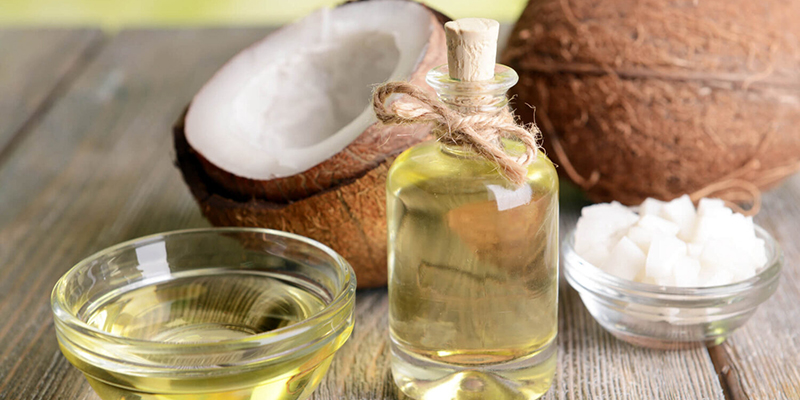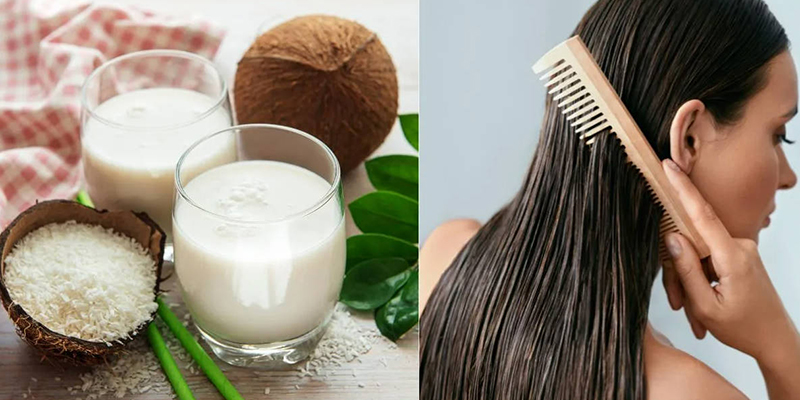How To Use Coconut Oil For Hair?
Coconut oil has become a prominent fixture in the hair care industry, garnering attention from beauty enthusiasts worldwide. Celebrated for its impressive benefits, coconut oil is known to deeply condition hair, nourish dry and brittle strands, and support a healthy scalp. Its unique composition sets it apart from other oils, allowing it to penetrate the hair shaft effectively, making it an invaluable ally against frizz and damage.
Let’s explore how to incorporate coconut oil into your hair care regimen to keep your hair vibrant and healthy.
What Is Coconut Oil?
Coconut oil is a natural oil derived from the flesh of mature coconuts (Cocos nucifera), which hails from tropical regions across the globe. This versatile oil has been cherished for centuries in culinary applications, beauty, and medicinal uses. The extraction of coconut oil generally involves two primary methods: cold-pressed and refined.

Cold-pressed coconut oil is produced by mechanically pressing fresh coconut meat without applying heat, which preserves its natural nutrients and aromatic flavour. This technique yields virgin coconut oil, renowned for its rich Scent and health benefits. Conversely, refined coconut oil is extracted from dried coconut (copra). It undergoes additional processing to eliminate impurities and odour, producing a more neutral product ideal for high-temperature cooking. Understanding these processing methods is essential for consumers, as choosing between cold-pressed and refined coconut oil can significantly influence flavour and health characteristics, ultimately impacting its efficacy in hair care routines.
Benefits Of Coconut Oil For Hair
Exceptional Moisturizing Properties
Coconut oil is cherished for its outstanding moisturizing abilities, making it an exceptional choice for hair care enthusiasts. Unlike many oils, such as olive and jojoba, coconut oil can penetrate the hair shaft deeply. This is attributed to its low molecular weight, which allows it to provide nourishment and hydration from within the hair strands. While olive oil may merely coat the hair, leaving it feeling greasy, and jojoba oil mimics natural sebum without penetrating as effectively, coconut oil delivers moisture directly into the hair, resulting in softer, shinier locks.
Reduction Of Protein Loss
One of coconut oil's most significant benefits is its remarkable ability to reduce protein loss when washing hair. Hair is composed primarily of protein, and exposure to water and shampoos can deplete these crucial proteins, causing brittleness and damage. Research has demonstrated that applying coconut oil before washing hair can significantly diminish protein loss by adhering to the hair's surface and preventing degradation during cleansing. Consequently, using coconut oil not only fortifies hair strands but also helps maintain their natural structure.
Antimicrobial Effects
Another valuable attribute of coconut oil is its antimicrobial properties, which are key in supporting scalp health and combating dandruff. Lauric acid, a fatty acid in coconut oil, exhibits potent antifungal and antibacterial properties that can aid in eliminating harmful bacteria and fungi from the scalp. This can reduce dandruff and other scalp-related infections. Regular application of coconut oil may contribute to a healthier scalp environment, leading to less flaking and irritation and ultimately promoting more substantial and more resilient hair growth.
How To Use Coconut Oil For Hair: A Comprehensive Guide
Coconut oil's nourishing properties make it a versatile hair care solution. Below is a detailed guide on effectively utilizing coconut oil through various treatments to achieve healthier hair.
1. Pre-Wash Treatment
Starting your hair care routine with coconut oil as a pre-wash treatment is an excellent way to hydrate and protect your strands before shampooing. Here's how to do it:
• Step 1: Begin with dry hair and use unrefined, organic coconut oil for optimal results.
• Step 2: Scoop 2-4 tablespoons of coconut oil, depending on your hair length. If the oil is solid, melt it between your palms.
• Step 3: Apply the oil directly on the scalp, gently massaging with your fingertips to invigorate blood circulation and nourish the scalp.
• Step 4: Distribute the remaining oil throughout your hair, particularly the ends.
• Step 5: Allow the oil to sit for at least 30 minutes. For enhanced benefits, consider leaving it on for up to 2 hours.
• Frequency: Incorporate this treatment into your regimen once a week to maintain adequate moisture levels.
2. Leave-In Conditioner
Post-wash, coconut oil becomes an effective leave-in conditioner. The application varies based on your hair type:
• For Thick Hair: Use one tablespoon of coconut oil, applying it uniformly throughout damp hair, focusing on tips to control frizz.
• A pea-sized amount is sufficient for thin hair. Rub it between your palms and lightly smooth it over your hair to prevent heaviness.
• Benefit: This application style assists in detangling hair, enriches shine, and reduces dryness.
3. Overnight Treatment
For intensive nourishment, consider utilizing coconut oil as an overnight treatment. This method facilitates deeper penetration of the oil into each strand.

• Step 1: Add coconut oil over your scalp and hair, similar to the pre-wash treatment.
• Step 2: Secure your hair in a soft towel or utilize a shower cap to contain the oil and avoid a mess while sleeping.
• Tip: Use an old pillowcase to prevent staining.
• Benefit: Upon washing your hair the following day, expect rejuvenated and moisture-rich locks.
Incorporating these various coconut oil treatments into your hair care routine can yield significant improvements, resulting in healthier, more vibrant hair that looks and feels fantastic.
Tips For Choosing The Right Coconut Oil
Choosing the correct type of coconut oil is essential for reaping its full benefits in your hair care efforts. Opt for organic, cold-pressed coconut oil, as these processes preserve the oil's inherent characteristics, ensuring that you utilize a product free from harmful chemicals. When examining labels, seek terms such as "extra virgin" or "unrefined" to confirm its purity. Be cautious of additives like fragrances, preservatives, or colourants that might compromise the oil's effectiveness and potentially irritate your scalp. Products marked as 100% pure coconut oil guarantee the highest quality, allowing you to make informed choices that effectively support your healthy hair regimen.
Cautions And Considerations
While coconut oil offers numerous advantages, it may not suit all hair types. Individuals with fine hair could find that the oil leaves their strands greasy or heavy. Furthermore, it is advisable to conduct an allergy test before using coconut oil, particularly for those with sensitive skin or known allergies, minimizing the risk of adverse reactions.
Discover The Versatility Of Coconut Oil
Coconut oil's versatility in hair care cannot be overstated. It provides many benefits, ranging from moisture retention to scalp health. We encourage readers to seamlessly integrate coconut oil into their hair care routines and observe the positive transformations it can bring to their tresses. Experimentation may unlock enhanced shine and manageability that you never thought possible!



















